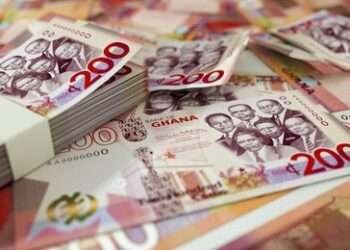Ghana’s national debt has been a growing concern in recent years, particularly as it continues to climb to unprecedented levels. With elections approaching, the issue of government debt has taken center stage in political discourse.
There was a renewed interest in Ghana’s debt levels when the Finance Minister, Dr. Mohammed Amin Adam, highlighted the gravity of the situation in his recent update on the state of the Ghanaian economy.
Mr. Kwabena Nyarko, a Financial Market Analyst and the CEO of Pipliquidator Fx, lending his voice to the raging debate on the topic in an interview with The Vaultz News, noted that the current state of Ghana’s debt is not just a matter of economic interest; adding that it has significant implications for the country’s capital market and the Ghana Stock Exchange (GSE).
“The rising national debt has direct ramifications for Ghana’s capital market. The capital market, which includes the bond market and the GSE, is highly sensitive to changes in government debt levels. A ballooning national debt can lead to several adverse outcomes.
“One of such is increased interest rates. You know, as the government borrows more, it competes with the private sector for available funds, driving up interest rates. Higher interest rates can stifle private investment, as businesses may find it more expensive to borrow for expansion or new projects. This could slow down economic growth, reducing corporate profits and, consequently, shareholder returns.”
Mr. Kwabena Nyarko
Mr Nyarko further noted that a government struggling to manage its debt may resort to printing money, leading to inflation. “High inflation erodes the value of fixed-income investments, such as bonds, and reduces the real returns for investors. This scenario could result in a flight of capital from the bond market to safer, more stable investment environments.”
Moreover, the analyst noted that if international credit rating agencies perceive Ghana’s debt as unsustainable, they may downgrade the country’s credit rating.
“Just as we witnessed recently, the country was downgraded my leading rating agencies. Generally, a downgrade increases the cost of borrowing for the government and private sector alike, further exacerbating the debt situation. Additionally, a lower credit rating could deter foreign investment in Ghana’s capital market, leading to reduced liquidity and lower asset prices.”
Mr. Kwabena Nyarko
Impact on the Ghana Stock Exchange
While narrowing the impact of Ghana’s escalating debts may have on the Ghana Stock Exchange (GSE), the analyst asserted that the Ghana Stock Exchange is not immune to the effects of rising national debt. “The stock market’s performance is closely tied to the overall health of the economy, and a deteriorating debt situation could have several negative consequences”.
According to Mr Nyarko, high levels of national debt can shake investor confidence in the economy’s stability. He explained that if investors perceive the government as unable to manage its debt, they may become wary of investing in Ghanaian equities. “This could lead to a decline in stock prices and market capitalization, reducing wealth for investors and limiting the ability of companies to raise capital through equity issuance.”
“Another impact you may think of is that the prospect of a debt crisis can create significant uncertainty in the financial markets. Investors may react to negative news about the debt situation by selling off their holdings, leading to increased market volatility. Such volatility can deter long-term investment, as investors seek to avoid the risks associated with unpredictable market movements.”
Mr. Kwabena Nyarko
Mr Nyarko noted that as the government raises taxes or cuts spending to manage its debt, businesses may face higher operating costs or reduced demand for their products and services. “This could lead to lower corporate earnings, which would negatively impact stock prices and dividend payments. In turn, this would reduce the attractiveness of equities as an investment option”.
Policymaking and the Way Forward
While deliberating on the way forward, the analyst proposed that to mitigate the potential impact of rising national debt on the capital market and the GSE, policymakers need to take decisive actions that could stabilize the situation and restore confidence among investors.
“The government must demonstrate a commitment to fiscal discipline by reducing budget deficits and controlling spending. Implementing prudent fiscal policies can help slow down the accumulation of debt and signal to investors that the government is serious about maintaining financial stability.”
Mr. Kwabena Nyarko
In some cases, Mr Nyarko stated that debt restructuring may be necessary to make the debt more manageable which the government has done. He noted that successful debt restructuring can alleviate some of the immediate pressure on the government and create a more sustainable debt profile.
Another policy the analyst pinpointed is the promotion of economic growth. He noted that a growing economy can generate the revenues needed to service debt without resorting to excessive borrowing.
“Policymakers should focus on creating a conducive environment for private sector growth by investing in infrastructure, improving the business climate, and fostering innovation. A vibrant private sector can boost tax revenues and reduce the government’s reliance on borrowing.”
Mr. Kwabena Nyarko
Meanwhile, as of July 31, 2024, Ghana’s public debt stood at GH₵761.1 billion, equivalent to USD 51.1 billion. This figure represents a staggering increase, reflecting the government’s heavy borrowing to finance various projects and programs. While the need for infrastructure development and social services is undeniable, the rapid accumulation of debt raises serious concerns about Ghana’s fiscal sustainability.
The growing debt burden is not just a number on a balance sheet; it is a significant challenge that policymakers must address to avoid a potential crisis. The rising debt has already triggered downgrade by international credit rating agencies, which has led to higher borrowing costs and reduced investor confidence.
Ghana’s rising national debt is a pressing issue with far-reaching implications for the country’s capital market and the Ghana Stock Exchange. As the government grapples with this challenge, it is essential to adopt policies that will stabilize the debt situation and restore investor confidence.
By addressing the root causes of the debt crisis and promoting sustainable economic growth, Ghana can avoid the worst consequences of its growing debt and ensure a prosperous future for its capital markets and citizens.
READ ALSO: Ghana’s Year of Return Initiative: An Underutilized Opportunity





















